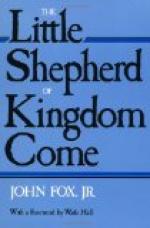The dance was a quadrille and the figure was “Grand right and left.” Margaret had met Richard Hunt opposite, half-way, when Chad reached the door and was curtseying to him with a radiant smile. Again the boy’s doubts beat him fiercely; and then Margaret turned her head, as though she knew he must be standing there. Her face grew so suddenly serious and her eyes softened with such swift tenderness when they met his, that a wave of guilty shame swept through him. And when she came around to him and passed, she leaned from the circle toward him, merry and mock-reproachful:
“You mustn’t look at me like that,” she whispered, and Hunt, close at hand, saw, guessed and smiled. Chad turned quickly away again.
That happy dawn—going home! The Major drowsed and fell asleep. The first coming light, the first cool breath that was stealing over the awakening fields, the first spring leaves with their weight of dew, were not more fresh and pure than the love that was in the boy’s heart. He held his right hand in his left, as though he were imprisoning there the memory of the last little clasp that she had given it. He looked at the Major, and he wondered how anybody on earth, at that hour, could be asleep. He thought of the wasted days of the past few months; the silly, foolish life he had led, and thanked God that, in the memory of them, there was not one sting of shame. How he would work for her now! Little guessing how proud she already was, he swore to himself how proud she should be of him some day. He wondered where she was, and what she was doing. She could not be asleep, and he must have cried aloud could he have known—could he have heard her on her knees at her bedside, whispering his name for the first time in her prayers; could he have seen her, a little later, at her open window, looking across the fields, as though her eyes must reach him through the morning dusk.
That happy dawn—for both, that happy dawn!
It was well that neither, at that hour, could see beyond the rim of his own little world. In a far Southern city another ball, that night, had been going on. Down there the air was charged with the prescience of dark trouble, but, while the music moaned to many a heart like a god in pain, there was no brooding—only a deeper flush to the cheek, a brighter sparkle to the eye, a keener wit to the tongue; to the dance, a merrier swing. And at that very hour of dawn, ladies, slippered, bare of head, and in evening gowns, were fluttering like white moths along the streets of old Charleston, and down to the Battery, where Fort Sumter lay, gray and quiet in the morning mist—to await with jest and laughter the hissing shriek of one shell that lighted the fires of a four years’ hell in a happy land of God-fearing peace and God-given plenty, and the hissing shriek of another that Anderson, Kentuckian, hurled back, in heroic defence of the flag struck for the first time by other than an alien hand.




